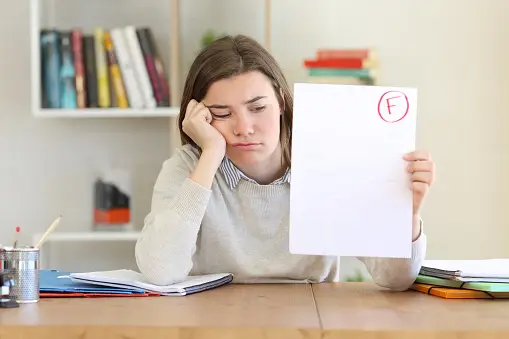When envelopes filled with GCSE results are handed out, they are accompanied by hopeful grins and anxious hearts. We’ve all been there, the anticipation before tearing open that envelope to reveal the fate of our academic endeavors. Even in your anxiety and hope, the thought of “What if I fail my GCSEs exams?” will still go through your mind.
Of course, you’ve spent countless nights poring over textbooks, surviving on caffeine and determination, yet the results aren’t exactly what you’ve envisioned. But this isn’t the end of your story.
This article will discuss the truth about what lies beyond the “fail” mark and unravel the answer to your burning question: what should I do if I fail my GCSE exams?
Table of contents
- What Are GCSEs?
- What is a Fail in GCSE?
- What Happens If You Fail Your GCSEs Exams?
- Can You Go To College If You Fail Your GCSEs?
- What To Do If I Fail My GCSEs Exams?
- How Many Times Can You Retake Your GCSEs?
- What Happens If You Fail Your GCSEs Exams Twice?
- Frequently Asked Questions On What Happens If I Fail My GCSEs Exams
- Conclusion
- References
- Recommendations
What Are GCSEs?
The GCSE (General Certificate of Secondary Education) is an academic qualification in specific subjects in Northern Ireland, Wales, and England. Meanwhile, Scotland state schools use the SQC (Scottish Qualifications Certificate). And Scotland private schools may use GCSEs from England.
Furthermore, each GCSE qualification covers a specific school subject (foreign languages, English literature, music, English language, drama, mathematics, classical civilization, science, business studies, history, art and design, geography, design & technology, etc.)
Additionally, most students begin their studies for GCSE exams in Year 9 or Year 10, lasting for two or three academic years (depending on the school, subject, and exam board). In England and Wales, the exams are taken at the end of Year 11.
What is a Fail in GCSE?
Under the UK grading system, any score below 4 is a fail. However, U represents ungraded, like a failure in the former grading system. So, if you get a grade of 3 or below in a GCSE subject, you have failed that subject.
Further, in the GCSE grading system, the grades are assigned using a scale from 9 to 1, with 9 being the highest and 1 being the lowest. A “fail” in GCSE would generally mean obtaining a grade between 1 and 3, depending on the GSCE subject and the grading thresholds set by the exam board.
It’s important to note that the specific grading requirements for a “fail” can differ depending on the subject, the exam board, and the year in which the exams were taken. And failing a GCSE exam might have implications for the student’s academic progression, but it’s not the end of the road.
There are usually opportunities for retaking exams, pursuing alternative paths, or focusing on other subjects where better grades are achieved. Remember, the educational journey is full of twists and turns, and a “fail” in one area can sometimes lead to unexpected successes in others.
Read this article: The Night Before a GCSE Exam: A Survival Guide in 2024
What Happens If You Fail Your GCSEs Exams?
So, you have just written your GCSE exams and are about to check your results. One inevitable question that will pop into your head is, “What if I fail my GCSEs exams?”
Failing your GCSE exams can be a disappointing experience, but it is not the end of the world. There are still many options available to you if you fail your GCSEs.
However, the consequences of failing your GCSEs can vary based on how many subjects you fail, your career goals, and your circumstances. Nevertheless, some potential effects include:
- Feeling frustrated and disappointed.
- Inability to attend the university (in most cases).
- Having to do extra qualifications or training.
- Failure to get your dream job.
- Having to accept lower-paying jobs.
Ultimately, many options are available if you have failed your GCSE exams. Keep reading to discover them.
Can You Go To College If You Fail Your GCSEs?
One question that may trouble you when prepping for your GCSEs is: can I go to college if I fail my GCSE exams? Well, failing your GCSEs doesn’t stop you from attending college. So, yes! You can still go to college if you fail your GCSEs.
Different colleges have various entry requirements and may accept applicants with lower grades. Or, they can advise you on other ways to get higher education.
If you are interested in attending college but have failed your GCSEs, you must talk to your school or college counselor. They can advise you on the best options and help you plan your next steps.
It is also essential to remember that failing your GCSEs is not the end of the world. Many successful people have failed their GCSEs. With hard work and determination, you can still achieve your goals.
See also: Top 15 Websites for GCSE Revision in 2024 with Answers
What To Do If I Fail My GCSEs Exams?
Now that we have discussed what happens if you fail your GCSEs exams, you should feel relieved. However, you might still be bothered about your next steps. Thankfully, several options are available if you have failed your GCSEs exams.
So, here’s what you should do if you fail your GCSEs exams:
1. Appeal your grade.
You have the right to challenge your grade if you believe your exam for one or more courses was incorrectly graded. And you can do this by submitting an appeal to your school or college, which will then ask the exam board to conduct a review.
The board will review and re-mark your exam after you make this request, giving you your final grade. You can visit the Ofqual student guide for further information about appealing your grade.
2. Discuss your options with your college or sixth form.
You can talk with your preferred institution about your possibilities if you want to continue to a sixth form or college. Depending on your results, they can present you with various options.
For instance, even if you narrowly missed the required entry grades, they might still be able to offer you a spot, significantly if unforeseen factors impact your performance.
Alternatively, they could suggest different institutions and colleges for you to apply to or offer you other courses that are better suitable for your prior academic success.
Check out: How to Find the Perfect French GCSE Tutor in 2024
3. Retake your GCSEs through your school.
Can you retake GCSEs? This is a common question for students who failed their GCSEs. Thankfully, the answer is yes! Retaking the GCSE exams will give you more time to study and prepare, making them the most fantastic option if you still want to obtain your qualifications.
In addition, you won’t have to pay any fees if you retake your GCSEs through your school. Meanwhile, you must retake the tests or enroll in a foundation course at a higher education level if you fail your English or Math GCSEs.
Nevertheless, if you fail most of your GCSEs, you can retake the subjects you need for the following steps. Retaking GCSEs won’t likely set you back in your academic career because most colleges and sixth forms let you study for them alongside A levels.
Moreover, your school, college, or sixth form can help you decide the best action.
4. Retake your GCSEs exams as a private candidate.
Conversely, you can retake your GCSEs as a private candidate if learning in a classroom with a prescribed schedule doesn’t work for you. This will give you much freedom because you can take online GCSE courses at your own pace to prepare for your exams.
Meanwhile, you will take your exam as a private candidate at the same time and location as other GCSE candidates, but you are responsible for making this arrangement independently.
You can do this by contacting nearby schools and institutions to see whether they will let you take your GCSE exams there. Nonetheless, you must pay a fee to the exam center to retake the exam as a private candidate.
Read also: Why Many Fail GCSE Exams in 2024
5. Apply for apprenticeships.
You can apply for an apprenticeship to advance in your profession while maintaining your academic pursuits.
After completing your apprenticeship, you can transition into full-time employment while receiving relevant education, on-the-job training, and compensation through an internship.
Since apprenticeships are available in many fields, you should have no trouble finding a job that will prepare you for your desired profession.
How Many Times Can You Retake Your GCSEs?
There is no age restriction for taking your GCSEs exams, nor is there a cap on the number of times you can retake them. However, you must pass the mandatory subjects of math and English with a minimum grade of 4.
You can also retake your GCSE often as necessary to pass. This is often how students take their GCSEs in school. Adults who want to increase their chances of landing a job can think about retaking their GCSE classes.
You’ll be able to finish your A-level coursework when you retake your GCSEs. Although getting a grade higher than 4 in the core GCSE courses is not required, it can lead to greater employment chances.
What Happens If You Fail Your GCSEs Exams Twice?
Even if you repeatedly fail your GCSEs, you can still retake them. However, given the difficulties, time restraints, financial burden, and emotional cost, this can be difficult for individuals. Each exam has a different price depending on the subject and who you book with.
For most individuals, scheduling examinations can seem like an enormous task because of their obligations to pay for child care, rent, food, health insurance, etc. However, there will be a cost for each year you retake the course, whether online or in person.
Because it raises your likelihood of passing, it is crucial to wait between rewrites.
Frequently Asked Questions On What Happens If I Fail My GCSEs Exams
Although the exam centers determine the precise cost of the exam centers themselves, you can anticipate paying upwards of £100 per exam for GCSEs and International GCSEs.
3, 2, and 1 are considered fail grades in GCSE exams. However, the constant, U, represents ungraded or unclassified.
Your sixth form choice can depend on your GCSE results. Sixth forms often use them as a scoring system to determine how well you will perform on their course.
You are required to take a minimum of five GCSE subjects. However, most students take up to nine or ten.
Thankfully, there is no limit on how many times you can retake your GCSE. So, if you fail your GCSE exams twice, you can retake them.
Conclusion
Failure at a GCSE does not have to spell the end of the world, even though it might be difficult and stressful. If you fail your GCSEs, many options are available, including retaking them, seeking alternative degrees or career paths, and getting help from educational experts.
Therefore, maintaining optimism is crucial because there are always ways to accomplish your goals, even if they take a little longer or demand a different strategy. However, keep in mind that failing your GCSEs does not indicate your level of achievement, and you can overcome academic disappointments by being determined and resilient.
There are always options available to move ahead and actualize your dreams if you fail your GCSEs exams, whether in a single subject or all of them.
References
en.wikipedia.org – General Certificate of Secondary Education
ealingindependentcollege.com – What happens if you fail your GCSEs
ncchomelearning.co.uk – What Happens If You Fail Your GCSEs?
oxbridgehomelearning.uk – What Happens If You Fail Your GCSEs? GCSEs for Adults






